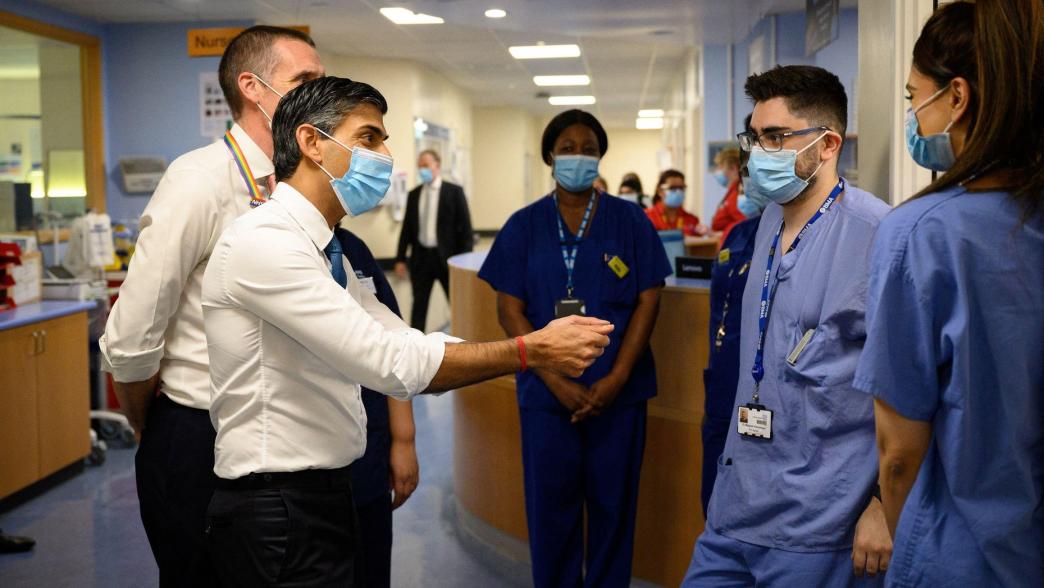Rishi Sunak’s analysis about pandemic trade-offs is over-simplistic
The prime minister's Covid inquiry appearance left questions unanswered.

Olly Bartrum says Rishi Sunak used his appearance before the Covid inquiry to perpetuate the false binary between health and the economy
“What, as the minister responsible for the economy and public finances, do you think an optimal strategy for managing the pandemic should look like, and why?” is the simple question that Rishi Sunak should have been asked at his Covid inquiry appearance. Understanding Rishi Sunak’s position on this question is, naturally, crucial to aiding our understanding of how ministers approached designing the government’s response to the pandemic through 2020 and 2021. However, this question was not asked.
Sunak believes there is a straight trade-off between public health and the economy
The answers of the prime minister (and former chancellor) made clear his assumption that restrictions were almost always bad for the economy, as Hugo Keith KC, the inquiry counsel, highlighted when talking through Sunak’s description of the cost of the first lockdown in terms of GDP lost and government borrowing. Keith should then have asked Sunak what consideration he had given – or analysis he had undertook – into the scenario where restrictions were not introduced, or a different set of restrictions were deployed, and the impact this would have had on the economy.
The answer from our own research and the field of pandemic economics is clear: the (purely economic) cost of not imposing restrictions – or moving too slowly – to the economy is high. People will avoid going out to spend money or go to work due to fear of the rapidly spreading virus, some will develop long-term complications that prevent them from working, and others will die. By summer 2020 there was plenty of expert evidence for the Treasury to draw on that underlined this point – the field of pandemic economics was well established before the pandemic and grew rapidly from March 2020 onwards.
Yet the thinking implied by Sunak’s answers and Keith’s questioning was that there is a straight trade-off between public health outcomes on one hand, and the economy on the other. This justified Sunak’s opposition to restrictions on the basis of economic and financial cost, and would also justify – on purely economic grounds – policies like Eat Out to Help Out. Keith said, in line with Sunak’s narrative, that the scheme had an “obvious economic advantage” and that there were “obviously good policy reasons for encouraging restaurant use in the context of restaurants which were already Covid-safe”.
The Treasury took part in a government tug-of-war during the pandemic
This is wrong. The trade-off is not linear. Disease prevalence can have a negative impact on the economy and, as a result, maintaining control of the virus will have beneficial economic impacts. Sometimes there is a direct trade-off. But there will be crucial moments – and many argue that Autumn 2020 was one – where public health and economic considerations pull in the same direction. If Eat Out to Help Out encourages disease transmission, then it is far from clear that it has an obvious economic advantage. Yet, as we outline in our in-depth research on the Treasury’s response, little effort was put into identifying the complicated nature of these trade-offs and what they mean for how policy should be designed.
Instead there was a tug-of-war in government (at least for much of 2020), with Sunak’s Treasury consistently arguing against restrictions on the basis of short-term costs, without fully thinking through the mid-longer run economic consequences of the counterfactual where there is higher disease prevalence. This resistance is likely to have slowed the imposition of restrictions at points, ultimately meaning that they needed to be stricter or in place for longer later down the line, with worse consequences for both public health and the economy.
Both during and after Sunak’s session, inquiry chair Baroness Hallett emphasised that oral hearings are not the only evidence she will consider. There are also thousands of pages of written statements, and (hopefully) a wealth of evidence on the advice and analysis supplied to ministers by civil servants through the pandemic, and the final report for module 2 – expected in early 2025 – will need to get to the bottom of these tricky but fundamentally important questions. When it does, it would be a mistake to perpetuate the false binary between health and the economy – or conclude that Eat out to Help Out was the Treasury’s only mistake when it came to its influence on overall pandemic policy. There are much bigger lessons to be drawn.
- Political party
- Conservative
- Administration
- Johnson government Sunak government
- Department
- HM Treasury Department of Health and Social Care
- Public figures
- Rishi Sunak Chris Whitty Matt Hancock Boris Johnson Patrick Vallance Baroness Hallett
- Publisher
- Institute for Government